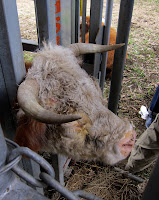 |
| Our rare new addition- the small one |
Depending on
- the rainfall
- the quality of grass
- the degree of sunshine
- the local economy
- the rural economy
- the global economy
- the weather in Russia or South America
- the current exchange rate
- the el nino/ la nina index
- the changing fashion for wagyu to angus burgers
We sell our cattle for a cents per kilo rate. In the past we've received anywhere from 196 cents/kg to 100 cents/kg for 350 - 450 kg animals.
That's right $1.96 - $1.00 / kg.
Compare that with the price you pay in the butcher shop or super market.
On a small holding it's hard not to get to know your stock animals, there will always the noisy one, the sociable one, the boof heads, the shy ones. So when they're loaded onto the back of a truck and trundled down the road there is a twinge of regret about their life and the fact that you have got to know them.
After a few years of this pattern we decided to try a new idea. And so was born the germ of an plan to go smaller. Like strawberries and tomatoes, certain breeds of cattle have been bred bigger over the years because big has always been better. But like the hollow, tasteless giant strawberry and the brilliant red but brick hard and tasteless big tomato, the bigger cattle have a limited appeal on smaller acreage and gourmet palates.
 |
| Compare the size - mini and regular |
Don't forget that above all cattle are ever willing lawnmowers with the added bonus of being enthusiastic fertilizer producers and they beat sitting on the slasher going round the paddock for hours on end.
We settled on miniature Herefords, a smaller but rarer version of what we already have because we know they can manage on our native pasture. They aren't too fussy, they just have to inhale a blade of grass to put on weight.
First came the bull from up north, then the cows from down south, their diminutive size means four of them fitted into a double horse float with room to spare.
Miniature Herefords might seem small by today's standards and they have had their ups and downs - literally. Back in the late 1700's they were large plow pulling oxen from the Welsh border region, later they were bred to be chunky fatty animals providing not just beef, but tallow for the candle trade, as the electric light took off so did a taller, leaner sized Hereford, no one needed or wanted fat any more. The popularity of smaller cuts of meat and small acre farms has helped reshape the Hereford yet again.
 |
| Horns - now you see em |
 |
| Now you don't |
Horns -- what horns I don't remember them.



No comments:
Post a Comment